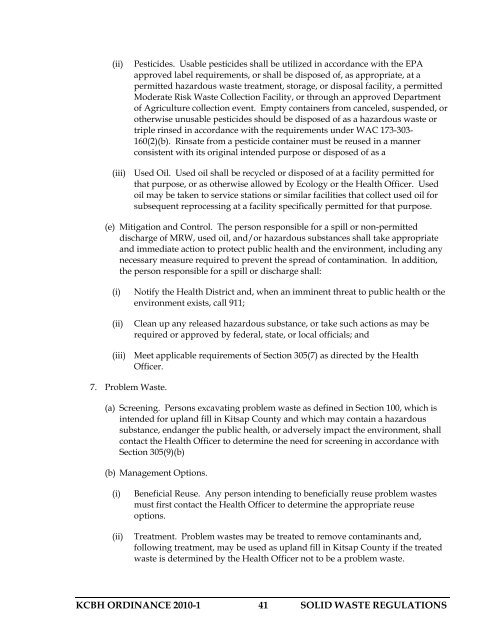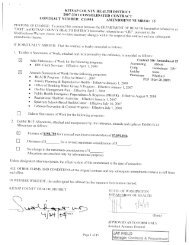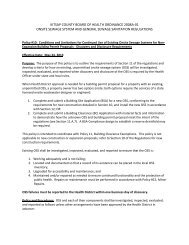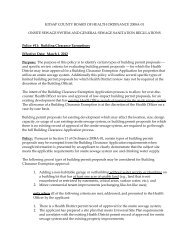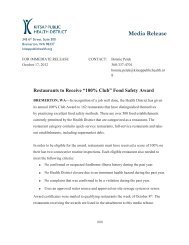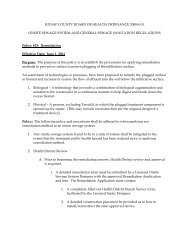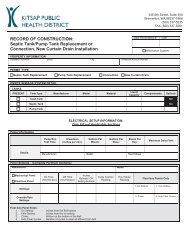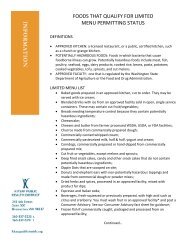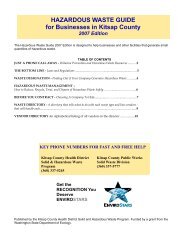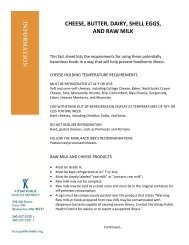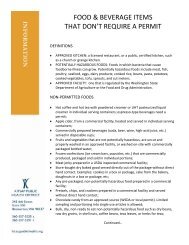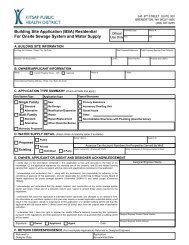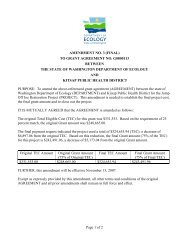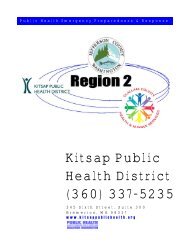SOLID WASTE REGULATIONS - Kitsap Public Health District
SOLID WASTE REGULATIONS - Kitsap Public Health District
SOLID WASTE REGULATIONS - Kitsap Public Health District
You also want an ePaper? Increase the reach of your titles
YUMPU automatically turns print PDFs into web optimized ePapers that Google loves.
(ii)<br />
Pesticides. Usable pesticides shall be utilized in accordance with the EPA<br />
approved label requirements, or shall be disposed of, as appropriate, at a<br />
permitted hazardous waste treatment, storage, or disposal facility, a permitted<br />
Moderate Risk Waste Collection Facility, or through an approved Department<br />
of Agriculture collection event. Empty containers from canceled, suspended, or<br />
otherwise unusable pesticides should be disposed of as a hazardous waste or<br />
triple rinsed in accordance with the requirements under WAC 173-303-<br />
160(2)(b). Rinsate from a pesticide container must be reused in a manner<br />
consistent with its original intended purpose or disposed of as a<br />
(iii) Used Oil. Used oil shall be recycled or disposed of at a facility permitted for<br />
that purpose, or as otherwise allowed by Ecology or the <strong>Health</strong> Officer. Used<br />
oil may be taken to service stations or similar facilities that collect used oil for<br />
subsequent reprocessing at a facility specifically permitted for that purpose.<br />
(e) Mitigation and Control. The person responsible for a spill or non-permitted<br />
discharge of MRW, used oil, and/or hazardous substances shall take appropriate<br />
and immediate action to protect public health and the environment, including any<br />
necessary measure required to prevent the spread of contamination. In addition,<br />
the person responsible for a spill or discharge shall:<br />
(i)<br />
(ii)<br />
Notify the <strong>Health</strong> <strong>District</strong> and, when an imminent threat to public health or the<br />
environment exists, call 911;<br />
Clean up any released hazardous substance, or take such actions as may be<br />
required or approved by federal, state, or local officials; and<br />
(iii) Meet applicable requirements of Section 305(7) as directed by the <strong>Health</strong><br />
Officer.<br />
7. Problem Waste.<br />
(a) Screening. Persons excavating problem waste as defined in Section 100, which is<br />
intended for upland fill in <strong>Kitsap</strong> County and which may contain a hazardous<br />
substance, endanger the public health, or adversely impact the environment, shall<br />
contact the <strong>Health</strong> Officer to determine the need for screening in accordance with<br />
Section 305(9)(b)<br />
(b) Management Options.<br />
(i)<br />
(ii)<br />
Beneficial Reuse. Any person intending to beneficially reuse problem wastes<br />
must first contact the <strong>Health</strong> Officer to determine the appropriate reuse<br />
options.<br />
Treatment. Problem wastes may be treated to remove contaminants and,<br />
following treatment, may be used as upland fill in <strong>Kitsap</strong> County if the treated<br />
waste is determined by the <strong>Health</strong> Officer not to be a problem waste.<br />
KCBH ORDINANCE 2010-1 41 <strong>SOLID</strong> <strong>WASTE</strong> <strong>REGULATIONS</strong>


